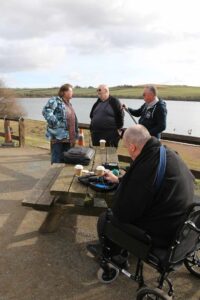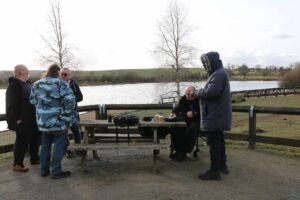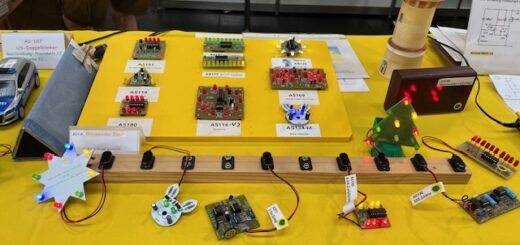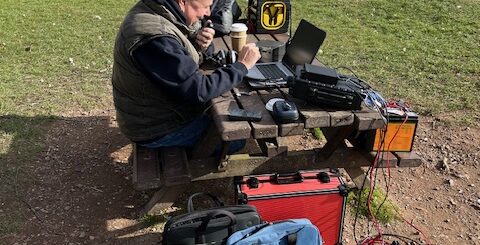A nice day to Play Radio at our Thrybergh meet-up.
A nice day to Play Amateur Radio at our Thrybergh meet-up.
 It was great to catch up with a couple of old friends at Thrybergh Country Park this week. We also got the opportunity to play radio outside. After sampling the delights of the café.
It was great to catch up with a couple of old friends at Thrybergh Country Park this week. We also got the opportunity to play radio outside. After sampling the delights of the café.
One of the great things about our regular meet-ups is meeting old friends or new faces. It is always good to meet the person behind this call sign.
The weather has not been that kind lately and the café so warm and the company so good that we have not managed any Parks on the Air (POTA) activations for a while.
However, we hope to be back on the air very soon.
 This week we also tried out a project based on KM4ACKs 73Linux, with this loaded onto a Raspberry Pi, which was connected to a ZLP Mini Pro in turn connected to my trusty Yaesu FT-879D. I was hoping to be able to connect to the hotspot the Raspberry Pi generates and then run WSJT-X and remotely operate my radio from my laptop in the Café.
This week we also tried out a project based on KM4ACKs 73Linux, with this loaded onto a Raspberry Pi, which was connected to a ZLP Mini Pro in turn connected to my trusty Yaesu FT-879D. I was hoping to be able to connect to the hotspot the Raspberry Pi generates and then run WSJT-X and remotely operate my radio from my laptop in the Café.
Sadly, that did not work, we had quite a few signal issues and needed to position the Car closer as well as investigate how to boost the WIFI signals.
In addition, I need to upgrade the power supply for the Raspberry Pi5.
We plan to return to this shortly – look out for G4SKM on the bands from Thrybergh.
73Linux
73Linux, developed by Jason KM4ACK, is an evolution of the Build-a-Pi project, designed to streamline the installation of amateur radio applications on Linux systems. Unlike its predecessor, which was tailored exclusively for Raspberry Pi devices, 73Linux extends its support to x86_64 Debian-based systems, enabling users to set up environments on laptops and desktops running distributions like Ubuntu or Mint with the same ease as on a Raspberry Pi.
Standout feature
A standout feature of 73Linux is its emphasis on user customization. The installation process is not a one-size-fits-all image but allows operators to select only the applications they require, ensuring a lean and efficient system tailored to individual needs. This modular approach is further enhanced by the “sideload” capability, which permits the integration of new applications through custom Bapp files. Users or organizations can develop these files and place them in the community directory, where the 73Linux menu system will automatically recognize and incorporate them alongside core applications. This is particularly beneficial for deploying custom Winlink or FLMSG forms, ensuring they are correctly installed and readily accessible.
Compatibility.
In terms of compatibility, 73Linux has been tested on the Raspberry Pi 4 running Pi OS 32-bit and on the Evolve Maestro laptop. Notably, it can be installed over existing Build-a-Pi setups; during the initial run, 73Linux will remove any previous Build-a-Pi installations to ensure a clean transition. The installation process is straightforward: users clone the 73Linux repository from GitHub and execute the setup script. Should any issues arise, such as the VARA application not installing on the first attempt, rerunning 73Linux and selecting VARA again typically resolves the problem.
Development
The development of 73Linux has been a collaborative effort. Contributors like Kelly Keaton have significantly enhanced the new menu system, and early testers, including patrons and users who reported bugs, have played a crucial role in refining the project. For those interested in contributing or seeking support, the project’s GitHub repository provides avenues for issue reporting and feature requests.
For users seeking a visual guide, a live stream featuring KM4ACK demonstrates how to use 73Linux to quickly set up applications like Winlink and YAAC (APRS Client) within an hour, offering a practical walkthrough of the installation and configuration process.
In summary, 73Linux offers a flexible and user-centric solution for amateur radio enthusiasts looking to deploy necessary applications on both Raspberry Pi and x86_64 Debian-based systems, combining ease of use with extensive customization options.



